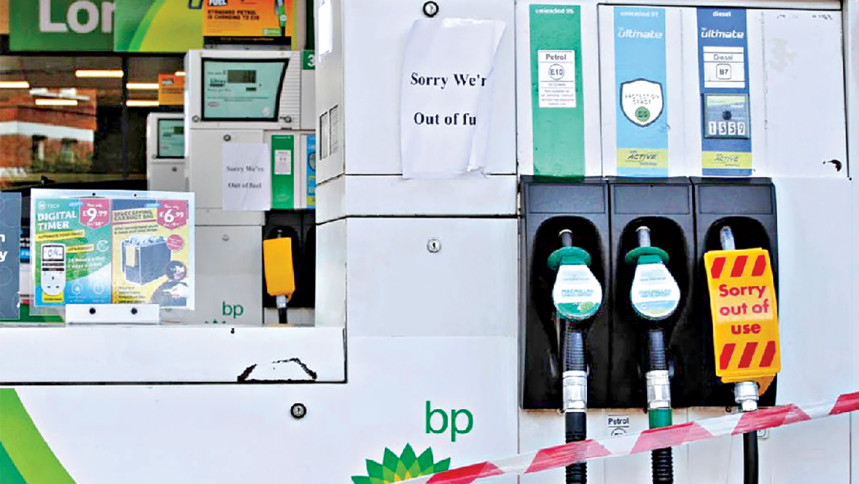Panic buying leaves 90pc fuel pumps dry in major British cities

Up to 90 per cent of British fuel stations ran dry across major English cities on Monday after panic buying deepened a supply chain crisis triggered by a shortage of truckers that retailers are warning could batter the world's fifth-largest economy.
A dire post-Brexit shortage of lorry drivers emerging after the Covid-19 pandemic has sown chaos through British supply chains in everything from food to fuel, raising the spectre of disruptions and price rises in the run up to Christmas.
Just days after Prime Minister Boris Johnson's government spent millions of pounds to avert a food shortage due to a spike in prices for natural gas, the biggest cost in fertilizer production, ministers asked people to refrain from panic buying.
But queues of dozens of cars snaked back from petrol stations across the country on Sunday, swallowing up supplies and forcing many gas stations to simply close. Pumps across British cities were either closed or had signs saying fuel was unavailable on Monday, Reuters reporters said.
The Petrol Retailers Association (PRA), which represents independent fuel retailers which now account for 65 per cent of all UK forecourts, said members had reported that 50 per cent to 90 per cent of pumps were dry in some areas.
"We are unfortunately seeing panic buying of fuel in many areas of the country," Gordon Balmer, executive director of the PRA, who worked for BP for 30 years, told Reuters.
"We need some calm," Balmer said. "Please don't panic buy: if people drain the network then it becomes a self-fulfilling prophecy."
Britain is considering calling in the army to ensure fuel supplies reach consumers, according to The Times and Financial Times.
Environment Secretary George Eustice said there was no shortage of fuel, urged people to stop panic buying and said there were no plans to get the army to drive trucks, though the Ministry of Defence would help with trucker testing.
Hauliers, gas stations and retailers warned that there were no quick fixes, however, as the shortfall of truck drivers - estimated to be around 100,000 - was so acute, and because transporting fuel demands additional training and licensing.
For months, supermarkets, processors and farmers have warned that a shortage of heavy goods vehicle (HGV) drivers was straining supply chains to breaking point - making it harder to get goods onto shelves.
Aldi UK CEO Giles Hurley said that while his discount supermarket chain was in a good position, nobody could guarantee there would not be inflation in the market around Christmas.
BP said on Sunday that nearly a third of its British petrol stations had run out of the two main grades of fuel as panic buying forced the government to suspend competition laws and allow firms to work together to ease shortages.
Business Secretary Kwasi Kwarteng said the suspension would allow firms to share information and coordinate their response.
"This step will allow government to work constructively with fuel producers, suppliers, hauliers and retailers to ensure that disruption is minimised as far as possible," the business department said in a statement.
The government on Sunday announced a plan to issue temporary visas for 5,000 foreign truck drivers. Around 25,000 truckers returned to Europe before Brexit and Britain was unable to test 40,000 drivers during Covid-19 lockdowns.
Source: www.thedailystar.net
